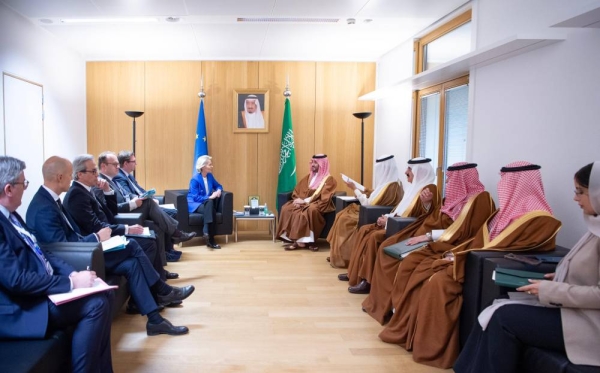The European Union is looking to establish an economic corridor with Gulf countries to enhance trade in renewable energy, data, and people-to-people exchanges. European Commission President Ursula von der Leyen made this announcement during a recent Gulf-European summit held in Brussels. The summit, attended by leaders from both regions including Saudi Crown Prince Mohammed bin Salman, focused on addressing the Middle East crisis, ongoing conflicts in Gaza and Lebanon, and broader economic issues.
Von der Leyen described her meeting with Crown Prince Mohammed bin Salman as positive and emphasized the importance of strengthening EU-GCC cooperation to ensure economic growth and security. She took to social media to highlight the goal of building an economic corridor to boost trade in renewable energy, data, and people-to-people exchanges between the two regions. The summit, themed “Strategic Partnership for Peace and Prosperity,” concluded with a commitment to enhance global and regional security and prosperity through dialogue, coordination, and engagement.
The joint statement released at the end of the summit expressed the partners’ commitment to preventing conflicts, resolving crises, and promoting sustainable investments in areas of mutual interest. It also emphasized the importance of fair partnerships that respect the economic conditions of each region and ensure an equitable distribution of responsibilities and benefits. Additionally, there was a readiness expressed to explore cooperation on initiatives such as the India-Middle East-Europe Economic Corridor (IMEC) and the EU’s Global Gateway framework.
The proposed economic corridor between the EU and Gulf countries aims to boost trade in key sectors such as renewable energy and data. This collaboration presents opportunities for both regions to leverage each other’s strengths and resources to drive economic growth and development. By working together, the EU and Gulf countries can create a more sustainable and prosperous future for their citizens while also addressing shared challenges and priorities.
The focus on renewable energy in the economic corridor aligns with the global shift towards sustainable and clean energy sources. Both the EU and Gulf countries have significant potential in the renewable energy sector, and a strategic partnership in this area could lead to mutual benefits and advancements in green technologies. By increasing trade in renewable energy, the EU and Gulf countries can contribute to combating climate change and reducing dependency on fossil fuels.
In addition to renewable energy, the economic corridor seeks to enhance trade in data and promote people-to-people exchanges between the EU and Gulf countries. Data has emerged as a valuable asset in the digital age, and fostering data trade can lead to increased innovation, economic opportunities, and collaboration in various industries. Furthermore, promoting people-to-people exchanges can strengthen cultural ties, boost tourism, and facilitate greater understanding and cooperation between the EU and Gulf countries.
Overall, the establishment of an economic corridor between the EU and Gulf countries marks a significant step towards deepening economic cooperation, fostering innovation, and promoting sustainable development. By leveraging their respective strengths and resources, the EU and Gulf countries can create a platform for long-term growth and prosperity while also addressing pressing global challenges. The commitment to collaboration in renewable energy, data, and people-to-people exchanges sets the stage for a mutually beneficial partnership that can drive economic progress and contribute to a more interconnected and prosperous future for both regions.











